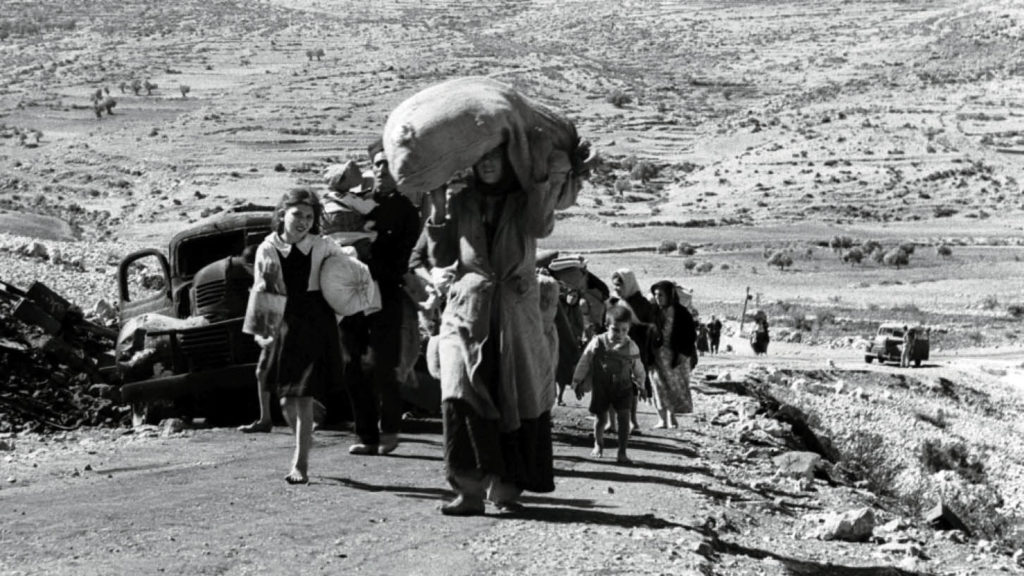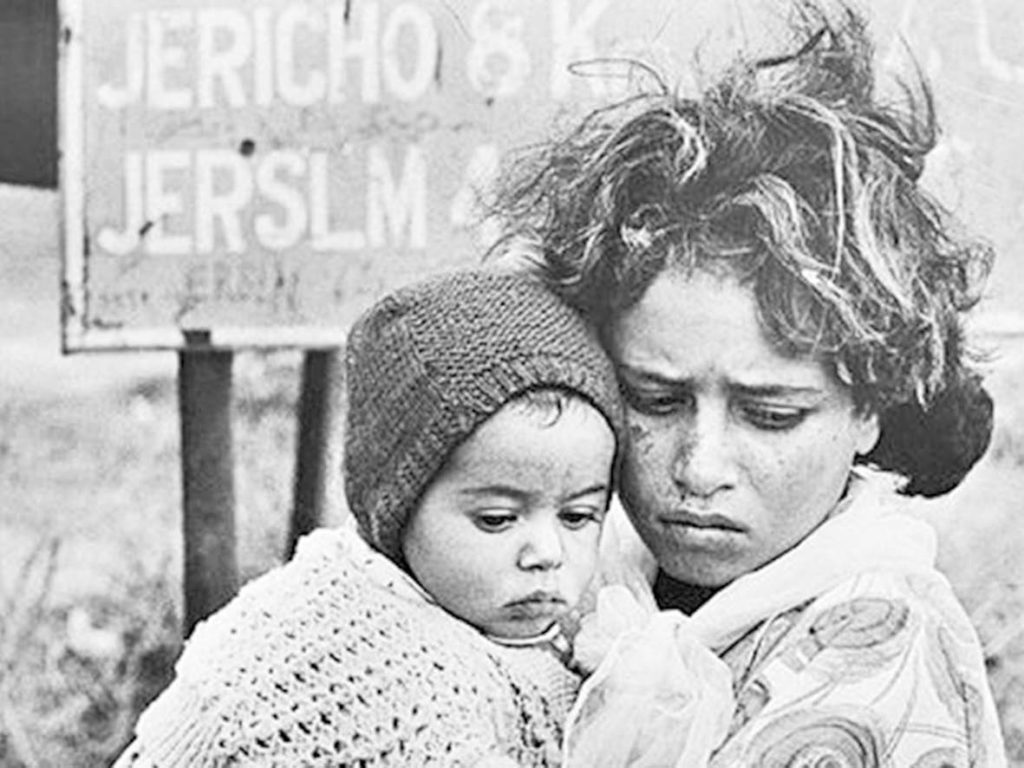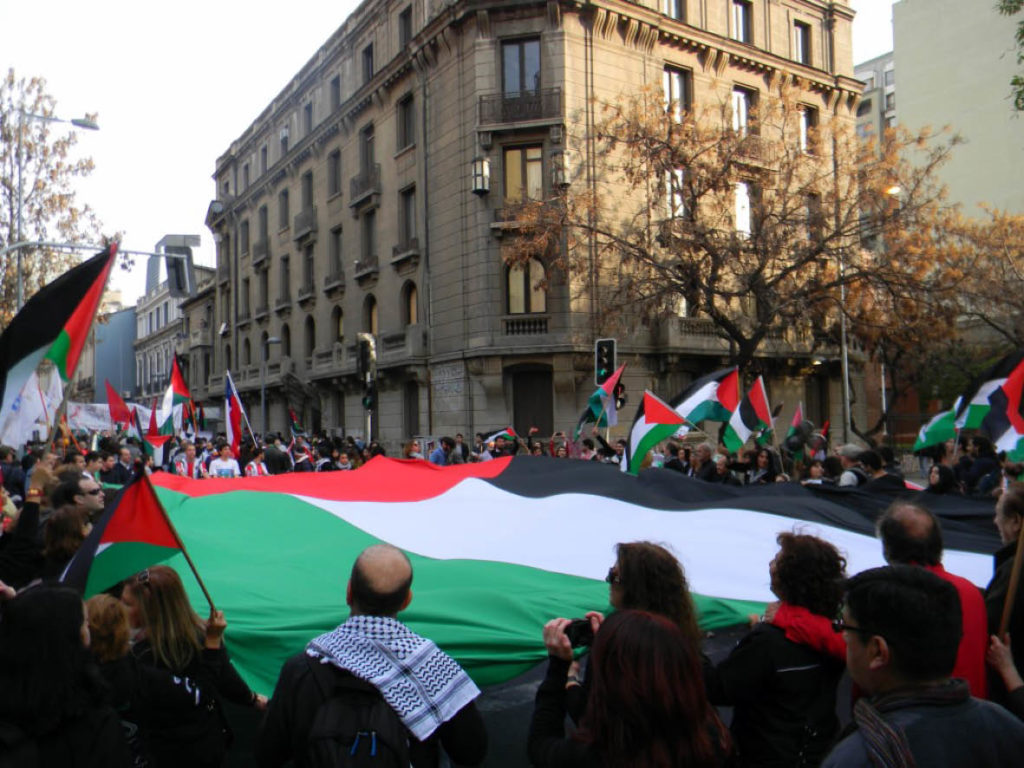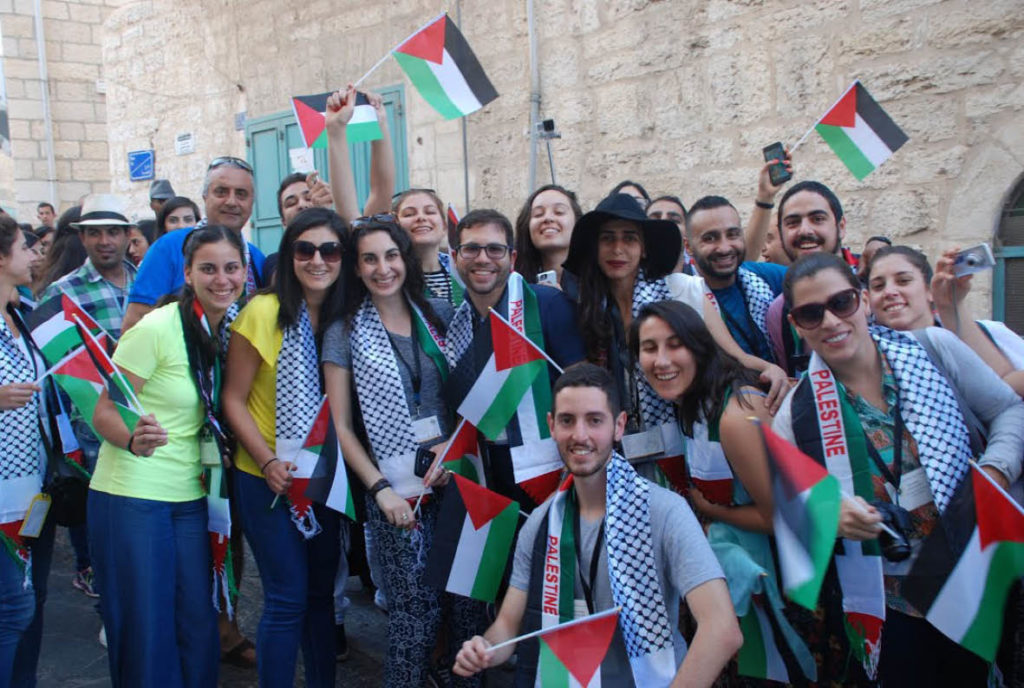In 1948, the Israeli onslaught on Palestine resulted in the expulsion of 750 thousand Palestinians from their homes and homeland. The Palestinians who remained in Palestine lived in the West Bank under Jordanian control, in Gaza under the Egyptian government, and in the rest of Palestine occupied by Israel. In 1967, another 250 thousand refugees were created.
In 2020, the Palestinians inside historical Palestine counted 6.7 million, and the Palestinians in the diaspora are estimated to have reached up to 6.5 million. The growth of the expatriate population stems, beyond natural growth, from the Palestinian people’s continued emigration from their homeland, caused mainly by the impact of Israel’s colonial-settler occupation.
As a consequence of the Nakba, the United Nations Relief and Works Agency (UNRWA) was created to protect and support the Palestinian refugees in Palestine, Jordan, Syria, and Lebanon. During the 1960s, the Palestine Liberation Organization (PLO) furthermore established its own national network to support Palestinian refugees and immigrants in the west and the rest of the Arab World, particularly in Egypt, Iraq, the Gulf countries, and North Africa. Among the Palestinians living outside of Palestine, prominent communities were formed in Europe, North and Latin America, and Australia, and some Palestinians went to other parts of Africa and to Asia. To create connections between the displaced Palestinians and the PLO – the sole and legitimate representative of the Palestinian people – created its own structures, adamantly defending the principle that all Palestinians have the right to return to their homeland, irrespective of whether they were forced out as a result of Israeli actions and policies or prevented from returning to it as full citizens.

The PLO created the Department of Expatriate Affairs in 2008, twelve years ago, as an umbrella organization that forges and maintains relations with and among Palestinians worldwide, except those living in Jordan, Lebanon, and Syria. The number of Palestinian expatriates outside the latter countries is estimated to be around 3 million people, yet no comprehensive census has ever been arranged to determine the exact number. Most of these individuals have obtained other nationalities, and their country of origin is registered in their adopted countries based on the passports they carried when they entered, which includes Jordanian, Egyptian, and Lebanese passports, among others – as Palestinian passports did not exist before the establishment of the Palestinian Authority (PA).
In September 2018, president Abbas assigned me to run the PLO’s Department of Expatriate Affairs based on my extensive experience in dealing with diaspora Palestinians. I have had many opportunities to meet with our expatriates worldwide since 1974, when President Arafat asked me to plan his historic trip to the United Nations. Around that time, I became his adviser on foreign affairs and was assigned head of the PLO Planning Center, the responsibility of which included the Palestinian diaspora. Holding this post for ten years, I have traveled around the world to meet our expatriates.
Between 1995 and 2000, Palestinians in the diaspora transferred to Palestine 1.5 billion dollars a year, whereas the international community and Arab donors transferred only one third of that amount annually.
When I came back home to Palestine in 1994, I continued to work closely with our expatriates while serving as the minister of planning and international cooperation, the name for the ministry of foreign affairs and economic planning in the early days of the PA. My relationship with our expatriates continued when I served as foreign minister of Palestine from 1999 until 2004, as the leader of Fateh’s foreign relations commission from 2009 to 2015, and as adviser on foreign relations to both president Yasser Arafat and president Mahmoud Abbas. My overall experience during these years was that there is immense concern and support among the Palestinians who live all over the globe.
With Turkey, a European country was strategically chosen for the first stage of the census of Palestinian expatriates worldwide because most Palestinian refugees encountered Europe as the first station on their way westward.
When I was appointed to lead the PLO’s expatriate department in 2018, I knew I was facing an immense challenge. Embarking on further travel to meet and communicate with our expatriates worldwide, my engagement was affected first and foremost by the lack of reliable data. Thus, in cooperation with Dr. Ola Awad, the head of the Department of Statistics (whose high level of professional expertise has recently been honored by president Abbas by granting her the status of a minister), and with the financial support of the president, I have initiated the ambitious statistical project of conducting a census of our expatriates. We began in Venezuela and Turkey, intending to use these countries as samples, in the hope of learning lessons that will enable us to adjust our methods to cover all expatriates around the world.

Starting the census with a European country was natural and necessary. Europe is the closest continent to Palestine that has accepted refugees. They came to Europe in 1948, 1967, 1982 (from Lebanon), 1991 (from Kuwait), and at other times. Still highly connected with the homeland and the Arab world, European expatriates pledge political allegiance to the various Palestinian parties, supporting Fatah, Hamas, the Popular Front for the Liberation of Palestine (PFLP), and the Democratic Front for the Liberation of Palestine (DFLP), among others. As a result, each political party has supported the creation of a separate union of Palestinian expatriates in Europe. Furthermore, there operates a union that calls itself the Independent Union, a phenomenon that is unique, as similar developments happened with neither the General Union of Palestine Students (GUPS) nor women unions, workers unions, or other associations.
As my first project, I plan to form one overarching body to reunite the expatriates and consider a democratic election as the best way to form a Union of Expatriates. A committee of representatives of political parties and respected personalities, with the support and participation of the PLO’s Department of Expatriate Affairs, shall handle, organize, and supervise the election process that shall start in cities and provinces, then move to the state level, and finally cover the entire European continent. Thus, one democratically elected union shall emerge in Europe. Similar processes shall cover North America, South America, Australia, and the Arab World (including the remaining expatriates in Africa and Asia). This shall lead us to one International Union of Palestinian Expatriates, an association representing 6.5 million Palestinians. A major achievement!
What can the Expatriates contribute to Palestine?
Palestinian expatriates started emigrating from their home country in the late nineteenth century (1860), a trend that continued in the early years of the twentieth century. Early migrants were mainly Christian Palestinians who suffered from discrimination and endured poor economic conditions under the Ottoman rule. A preferred destination for refuge was South America, with Chile in particular. Later on, economic conditions led to further migration to Central and North America, Europe, and Australia. In Latin America, the majority of Palestinian immigrants originates from the Bethlehem area; in North American, they came mainly from Ramallah and its surroundings; in Europe, they came from all over the homeland or from refugee camps in Lebanon, Jordan, Syria, Iraq, and the Gulf countries. In 1948 came the forced expulsion carried out by the Zionist gangs, followed in 1967 by the Israeli apartheid-style occupation of what had remained of Palestine.

Palestinian immigrants in the Americas have enjoyed great professional, economic, and social successes. Our expatriates have succeeded in creating businesses, reaching government positions, and establishing themselves as professionals, medical doctors, university professors, and technical experts. They have become citizens in their new countries but never forgot Palestine.
Expatriates’ commitment to their homeland Palestine and to their families over the decades expressed itself in their transfers of funds to their families. Many saved their money to be able to purchase land and real estate, and some have been giving donations to charitable organizations. Numerous buildings at Birzeit and Najah universities were donated by expatriates. In Gaza, they built the power company and telephone system and explored for gas offshore. But the majority invested in real estate. The reasons are clear: with Israel’s ongoing aggressive acquisition of our land and the continuing colonial settlement program, the price of the remaining land goes up and the value of building rises, and managing investment in real estate is much easier than managing industrial and agricultural businesses. There is also the patriotic romantic yearning to own a home in Palestine. All of these factors explain the continued interest of investing in Palestinian real estate.
But there are also other, practical forms of engagement. Palestinian medical doctors in the diaspora yearn to contribute to Palestine. Obtaining a medical education in Europe has been the dream of many Palestinians. Spain, Portugal, Germany, Austria, Hungary, Romania, Russia, and the Ukraine are countries that have produced thousands of Palestinian medical doctors. While some of them returned home or found employment in Arab countries, the majority remained in Europe, with the exception of graduates from the ex-Soviet Union. These doctors can help their country. German graduates have developed a program through which groups of medical doctors, in cooperation with the Palestinian Ministry of Health, spend three months in Palestinian hospitals as volunteers, treating patients, performing difficult operations, training local doctors and medical professionals, and bringing with them donated equipment. Whenever one group leaves, another group of volunteers arrives. We have been able to expand the program this year to include Palestinian doctors from all around Europe.
My vision is, furthermore, to bring “home” expatriate business people as well as experts and trainers in various fields, enabling them to transmit their knowledge and help develop their mother country, Palestine. This endeavor requires much work from local businesspersons and from staff at the ministries of economy, education, construction, health, finance and planning, agriculture, and industry. These ministries have already provided information and are giving incentives to expatriates to come back home in order to participate in, finance, and develop businesses and successful professional institutions.
Education is another important element of my vision for the development of Palestine, as I aim to encourage expatriates to continue their relations with their home country by sending their children to study at Palestinian universities, particularly in summer courses. Interested in developing summer camps for expatriate children, I have found readiness and support from our universities, the ministry of education, and the youth and sports council. Palestinian universities are planning to offer courses in the geography, history, and political science of Palestine in English, Arabic, and Spanish. We are also planning to help start Palestinian schools in the diaspora, particularly in Europe and Latin America. I hope these programs can be started this year.
We need to provide services to our expatriates as much as we want them to provide help for their country. We have been highly engaged in the unification process and the forming of the International Union of Palestinian Expatriates because it will help rebuild important, strong institutions for the expatriates through democratic means. Such institutions will be able to help expatriates in their new homeland while simultaneously enabling them to help and support their original homeland, Palestine.
Of strategic importance is that strong unions of expatriates can serve as actors in the exerting of political influence on behalf of Palestine in the adopted countries. These unions will strengthen and enhance diaspora Palestinians’ ability to influence the political positions of countries worldwide. One should only remember the influence of Zionist organizations on the political decision-making process of European and American countries.
The Department of Expatriates provides information to Palestinian expatriates through social media and the internet and supports cultural activities in the diaspora.
The latest success has taken place in Australia, where our expatriates were able to place pressure on the prime minister, preventing him from moving the Australian embassy from Tel Aviv to Jerusalem. In Europe and Latin America, our close ties with social democratic parties have been strengthened by the voting power of our expatriates who as voters and party members of these parties have encouraged them to support Palestine. And we should not forget the support our expatriates have given to our quest to achieve recognition as an independent Palestinian state from countries worldwide.
The relationship with our expatriates is a two-way road.
We must realize also, however, that in Palestine, we have to offer more services to our expatriates. One immense problem expatriates face is related to inheritance. When a father or grandfather dies, expatriate relatives have great difficulties in securing their rights. They need legal advice, and we are planning to offer it.

Initial difficulties we had in defining our relation with the Palestinian Ministry of Foreign Affairs and its embassies vis-à-vis the Department of Expatriate Affairs have been overcome, as I was able to clarify the relationship. Palestinian expatriates consider and deal with Palestinian embassies as the representatives of our state. The embassies issue their passports, and all official interactions with Palestine are carried out via the embassies. The international organization of expatriates, their elections, unions, and relationship with the homeland, on the other hand, shall be managed by the PLO and its expatriate department. The International Union of Expatriate Affairs protects and guarantees the quest to achieve the refugees’ right of return; it will also help arrange for the election of their representatives at the Palestine National Council (PNC).
Having overcome initial disagreements, the relationship between the PLO’s Department of Expatriates and the Palestinian Ministry of Foreign Affairs is very smooth and friendly today.
The financial difficulties the Palestinian government is facing have made it very difficult to hire personnel and arrange for visits or to initiate projects for our expatriates in their adopted countries. The PLO’s expatriate department has been able to organize a conference in Bucharest, Romania, that was attended by 168 representatives from all over Europe, plus some 100 expatriates from Romania. It resulted in the formation of a Palestinian Businessmen Committee, a medical committee, and committees for women, youth, Jerusalem, and other political issues such as the right of return, fighting Israeli settlements and apartheid, and a committee on achieving unity.
Concrete action as a result of this conference is under way. The businessmen and medical doctors’ committees have started to plan and implement their programs. A meeting in Athens has produced an investment fund for Palestine, which will allow small investors to invest in their country of origin by buying shares. Investors do not need to assume any management responsibilities for their investment in this fund, as it will have experts on the ground searching for industrial and agricultural projects, beyond real estate. Cooperation between Palestinian businesspersons and medical doctors may also lead to investment in private hospitals and pharmaceutical industries.
In conclusion, I can assert that a year of running the PLO’s Department of Expatriate Affairs has been a marvelous opportunity to work with expatriates everywhere. Success has been achieved in producing measures towards unification and institution building. It will require more work, however, to achieve the hoped-for International Union of Palestinian Expatriates that shall represent our expatriates in Europe, the Americas, the Arab world, and Australia.
Bringing expatriate investment to industry and agriculture in Palestine can proceed nevertheless, given the fact that, according to IMF figures, Palestine expatriates have in 2019 transferred 2.8 billion dollars to Palestine, 4.4 billion dollars to Jordan, and 1.6 billion dollars to Lebanon. We must develop the policies and plans that can attract such support and tie these funds to projects that can truly build Palestine and help establish its independent economy while protecting the interests and investments of our expatriates.
We need to regain other expatriates’ interests and commitment to Palestine and earn their trust in our government and its institutions as well as in the PLO as the political representative of the Palestinian people. We have to assure them of our commitment to their right of return and must involve them in our decision-making processes. We hope that our expatriates will continue their efforts and engagement to maintain unity and democracy out of commitment to their home country, Palestine.
After all, our expatriates constitute half of our people. We love and trust them. We have to work together for the liberation and development of Palestine.


